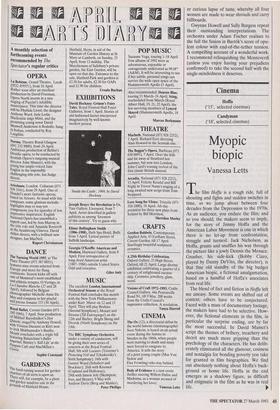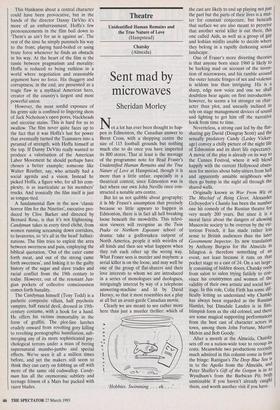Cinema
Hoffa ('15', selected cinemas) Candyman (`18', selected cinemas)
Myopic biopic
Vanessa Letts
The film Hoffa is a rough ride, full of shouting and fights and sudden switches in time, as we jump about between four decades from the Depression to the 1970s. As an audience, you endure the film; and so you should, the makers seem to imply, for the story of Jimmy Hoffa and the American Labor Movement is one in which there is no let-up from confrontation, struggle and turmoil. Jack Nicholson, as Hoffa, grunts and snuffles his way through the picture like a jowly Dennis the Menace. Gnasher, his side-kick (Bobby Ciaro, played by Danny DeVito, the director), is that fine old standby of the big budget American biopic, a fictional amalgamation, based on a handful of Hoffa's associates from real life.
The blend of fact and fiction in Hoffa left me uneasy. Some events are shifted out of context; others have to be conjectured. Faced with a mass of documentary footage, the makers have had to be selective. How- ever, the fictional elements in the film, in particular the surprise ending, are by far the most successful. In David Mamet's script the themes of bribery, treachery and deceit are much more gripping than the psychology of the characters. He has delib- erately eliminated all the glamour, cosiness and nostalgia for bonding poverty you take for granted in film biographies. We find out absolutely nothing about Hoffa's back- ground or home life. Hoffa in the end emerges as a shadowy figure, as difficult and enigmatic in the film as he was in real life. This blankness about a central character could have been provocative, but in the hands of the director Danny DeVito it's more of an embarrassment. Hoffa's few pronouncements in the film boil down to Them's as ain't for us is against us'. The rest of the time he simply pummels his way to the front, playing hard-boiled or using brute force whenever he finds an obstacle in his way. At the heart of the film is the tussle between pragmatism and morality: Hoffa is reduced to being ruthless in a world where negotiation and reasonable argument have no force. His thuggery and corruptness, in the end, are presented as a tragic flaw in a mythical American hero, creator of the country's largest and most powerful union.
However, the most sordid exposure of his grimy side is confined to lingering shots of Jack Nicholson's open pores, blackheads and nicotine stains. This is hard for us to swallow. The film never quite faces up to the fact that it was Hoffa's lust for power that eventually turned the Teamsters into a pyramid of strength, with Hoffa himself at the top. If Danny DeVito really wanted to produce a valorisation of the American Labor Movement he should perhaps have chosen a better example; someone like Walter Reuther, say, who actually had a social agenda and a vision. Instead he picked Hoffa, a figure who, for all his com- plexity, is as inarticulate as his members' trucks. And ironically the film itself is just as tongue-tied.
A fundamental flaw in the new 'classic horror film for the Nineties', executive pro- duced by Clive Barker and directed by Bernard Rose, is that it's not frightening. Candyman takes in every tired cliché, from women running screaming down corridors, to lavatories, to 'it's all in the head' halluci- nations. The film tries to exploit the area between sweetness and pain, employing the biblical quotation, 'Out of the eater came forth meat, and out of the strong came forth sweetness', and linking it to the guilty history of the sugar and slave trades and racial conflict from the 19th century to today. However, out of the resonant Jun- gian pockets of collective consciousness comes forth banality.
The Candyman himself (Tony Todd) is a pathetic composite villain, half psychotic vampire, half rancid devil, dressed in 19th- century costume, with a hook for a hand. He offers his victims immortality in the form of graffiti. The plot-line lurches crudely onward from revolting gory killing to revolting pornographic humiliation, sub- merging any of its more sophisticated psy- chological terrors under a mass of boring supernatural mumbo-jumbo and special effects. We've seen it all a million times before, and yet the makers still seem to think they can carry on fobbing us off with more of the same old codswallop. Candy- man has all the oxymoronic subtlety and teenage frisson of a Mars bar packed with razor blades.



























































 Previous page
Previous page